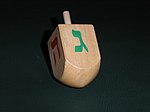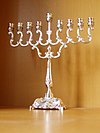Dreidel

A dreidel (Yiddish: דרײדל dreydl plural: dreydlekh,[1] Hebrew: סביבון Sevivon) is a four-sided spinning top, played with during the Jewish holiday of Hanukkah. The dreidel is a Jewish variant on the teetotum, gambling toy found in many European cultures.
Each side of the dreidel bears a letter of the Hebrew alphabet: נ (Nun), ג (Gimel), ה (Hei), ש (Shin), which together form the acronym for "נס גדול היה שם" (Nes Gadol Hayah Sham – "a great miracle happened there"). These letters also form a mnemonic for the rules of a gambling game played with a dreidel: Nun stands for the Yiddish word nisht ("nothing"), Hei stands for halb ("half"), Gimel for gants ("all"), and Shin for shtel ayn ("put in"). In Israel, the fourth side of most dreidels is inscribed with the letter פ (Pei), rendering the acronym, נס גדול היה פה, Nes Gadol Hayah Poh—"A great miracle happened here" referring to the miracle occurring in the land of Israel. Some stores in Haredi neighbourhoods sell the ש dreidels.
Etymology

The Yiddish word "dreydl" comes from the word "dreyen" ("to turn", compare to "drehen", meaning the same in German). The Hebrew word "sevivon" comes also from the root "SBB" ("to turn") and was invented by Itamar Ben-Avi (the son of Eliezer Ben-Yehuda) when he was 5 years old. Hayyim Nahman Bialik used a different word, "kirkar" (from the root "KRKR" – "to spin"), in his poems,[2] but it was not adopted into spoken Hebrew.
Symbolism
Some rabbis ascribe symbolic significance to the markings on the dreidel. One commentary, for example, connects the four letters with the four exiles to which the nation of Israel was historically subject—Babylonia, Persia, Greece, and Rome.[3] While not mandated (a mitzvah) for Hanukkah (the only mandated mitzvot are lighting candles and saying the full hallel), spinning the dreidel is a traditional game played during the holiday.[4]
Rules of the game
Each player begins with an equal number of game pieces (usually 10–15). The game pieces can be any object, such as chocolate gelt, pennies, or raisins.
- At the beginning of each round, every participant puts one game piece into the center "pot". In addition, every time the pot is empty and sometimes if it has one game piece left, every player puts one in the pot.
- Each player spins the dreidel once during their turn. Depending on which player side is facing up when it stops spinning, they give or take game pieces from the pot:
- a) If נ (nun) is facing up, the player does nothing.
- b) If ג (gimel) is facing up, the player gets everything in the pot.
- c) If ה (hei) is facing up, the player gets half of the pieces in the pot. (If there are an odd number of pieces in the pot, the player takes the half the pot rounded up to the nearest whole number)
- d) If ש (shin) or פ (pei) is facing up, the player adds a game piece to the pot (often accompanied with the chant "Shin, Shin, put one in"[5]). In some game versions a Shin results in adding three game pieces to the pot (one for each stem of the Shin). This alternative version increases the overall fairness of the game.
- If the player is out of pieces, they are either "out" or may ask another player for a "loan".[6]
These rules are comparable to the rules for a classic 4-sided teetotum, where the letters A, D, N and T form a mnemonic for the rules of the game, aufer (take), depone (put), nihil (nothing), and totum (all). Similarly, the Hebrew letters on a dreidel may be taken as a mnemonic for the game rules in Yiddish.
Collections
Childhood enjoyment of dreidels has led to interest in collecting them in adulthood.[7] Jewish institutions such as the Spertus Institute of Jewish Studies, Yeshiva University and Temple Emanu-El in New York, house dreidel collections, as do museums such as the Spinning Top and Yo-Yo Museum in Burlington, Wisconsin.[7]
Tournaments
Dreidel is now a spoof competitive sport in North America. Major League Dreidel (MLD), founded in New York City in 2007, hosts dreidel tournaments during the holiday of Hanukkah. In MLD tournaments the player with the longest Time of Spin (TOS) is the winner. MLD is played on a Spinagogue, the official booms spinning stadium of Major League Dreidel. Pamskee was the 2007 MLD Champion. Virtual Dreidel was the 2008 MLD Champion.[8] In 2009, Major League Dreidel launched a game version of the Spinagogue.[9]
In 2009, Good Morning America published a story on Dreidel Renaissance reporting on the rising popularity of the dreidel.[10] Dreidel games that have come out on the market since 2007 include No Limit Texas Dreidel,[11] a cross between traditional dreidel and Texas Hold'em poker, invented by a Judaica company called ModernTribe.[12] Other new dreidel games include Staccabees[13] and Maccabees.[14]
See also
References
- ^ Dreydlekh is also a term in klezmer music
- ^ "Ben Yehuda organization: Bialik". Benyehuda.org. Retrieved 2011-12-23.
- ^ Yaakov, Rabbi. "Secret of the Dreidel". Ohr.org.il. Retrieved 2011-12-23.
- ^ Brooklyn Man Wins Dreidel Spinning Contest
- ^ LeBon, Marilee (2001). The complete idiot's guide to holiday crafts. p. 73. ISBN 9780028642000.
- ^ "How to Play". Myjewishlearning.com. Retrieved 2011-12-23.
- ^ a b "Oh Dreidel, Dreidel, Dreidel: A favorite holiday pastime takes center table". Forward.com. Retrieved 2011-12-23.
- ^ "No Gelt, No Glory: A Dreidel Champion Is Crowned". Npr.org. Retrieved 2011-12-23.
- ^ "Spinagogue". Moderntribe.com. Retrieved 2011-12-23.
- ^ Milberger, Michael (2009-12-12). "Dreidel Games Generation". Abcnews.go.com. Retrieved 2011-12-23.
- ^ "No Limit Texas Dreidel". Texasdreidel.com. Retrieved 2011-12-23.
- ^ http://www.moderntribe.com
- ^ "Staccabees". Staccabees. Retrieved 2011-12-23.
- ^ "Battle of the Bees: Two games put a new spin on traditional dreidel game". Jweekly.com. 2009-12-03. Retrieved 2011-12-23.

